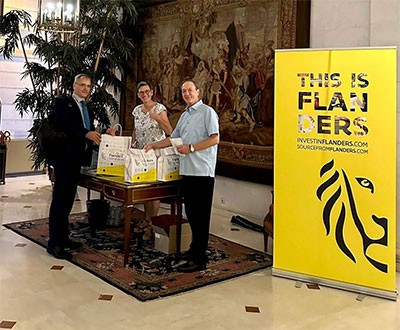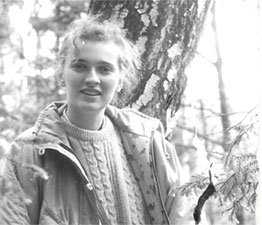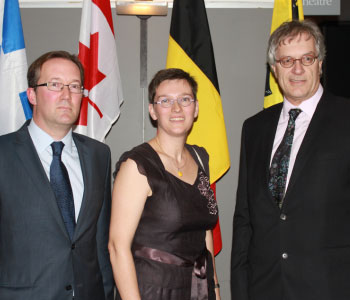-
Contact usthrough our contact page
#ExpatLife
“I have a skin as thick as an elephant's.”
Mieke Pynnaert’s expat story

Mieke Pynnaert is the first Global Expat Officer at Flanders Investment & Trade. As the first point of contact for her colleagues abroad, she gives practical tips and important information. For this, she can rely on her own years of experience. After all, expat life fits her like a second skin. By the age of four, Mieke already knew she was made to lead the life of an expat. Travelling around the world with her parents turned her into a young adventurer. Later, her university studies in Poland would be only the beginning of an expat career that was to go on for nearly 30 years.
Although, like Columbus, she never reached India, it did lead her to Kenya, South Africa, Brazil, Canada and Morocco. “I left without making too many plans and soon realised that for medical care, you are better off in Belgium anyway.”
For years, Mieke was affiliated with the Overseas Social Security and she never doubted it for a second. The coronavirus pandemic brought an end to her expat story in 2020. For now, she has no desire to go back – her family is the reason she’s sticking around. “As long as my parents and mother-in-law are alive, there’s little chance for me to resume my expat life.”
The expat bug
“My parents loved to travel. We didn’t have a car but we travelled to several countries. So when my girlfriends went to the Ardennes or the seaside with their parents, we went abroad by plane or train.” Mieke’s parents were true globetrotters. This lead to unique experiences in countries such as Bulgaria and Switzerland.
This early immersion in the wider world sparked her interest in expat life.
“I had a knack for languages. That made it easier to communicate during those many trips. Moreover, during my History studies, I had the opportunity to learn about places outside Belgium through numerous guest lectures by foreign professors.”Mieke’s dream of speaking beyond the classroom across national borders kept growing.
Poland: a journey into language, culture and love

“The spark completely struck in the early 1990s when I was visiting friends in Poland. A few weeks before my departure, I attended a guest lecture by a Polish psychology professor. He invited me to visit the university (in fact, the KUL, aka KU Lublin) in Poland. After the tour, he told me that there was a postgraduate degree in Polish language and culture for foreigners.” That was the beginning of Mieke’s expat life. With only a small suitcase, she left for Poland all alone. “I didn’t speak a word of Polish but after one year, I came back with a backpack full of experiences and I spoke the Polish language.” After her studies, she joined the embassy in Poland. “During that period, besides the language and culture, I also met the love of my life.”
It takes two to tango
“A few years later, I applied for the job as an Office Manager at the College of Europe in Poland. Before I got the job, I resigned from the embassy and returned to Belgium.” Eventually, Mieke got the opportunity to start at Natolin College, but by then, she had already settled in Mechelen. “A year later, I was seized with a thirst for adventure. We wanted to embark on another expat adventure.”
Her husband got the opportunity to leave for Kenya through his job at the FPS Defence.
“It was remarkable and progressive that the FPS wanted to know how I, as the partner, felt about such an expat adventure. And I really liked that because sometimes partners are forgotten in the expat story.”
The colonel in Nairobi wanted to know if Mieke knew that her husband had applied for the position in Nairobi. He also wanted to see if the couple was on the same wavelength. “It is often underestimated, but the partner largely determines the success of the expat story. I gave up my job in Belgium and started to work as a volunteer.”
From Nairobi to Johannesburg
“A year before we were to leave Kenya, I realised that - if we went back to Belgium - there would be a gap in my career. I assumed that my voluntary work would not count as years worked. Thus, I started to work as a secretary at the Nairobi embassy. There here, I came into contact with Export Flanders (then Flanders Investment & Trade). They were looking for a new Flemish Economic Representative.” Mieke did not hesitate for a moment and sent in her application.
Before she was allowed to go to the next round, she had to provide some additional information. “The electricity supply in Nairobi was not always reliable, and I still had to complete an elimination questionnaire. That was just before we planned to leave on a trip to Tanzania.” Mieke had to move quickly, so she set up the generator and sent over the last documents.
After the Tanzania trip, she received some good news. She was allowed to move to the next round in Brussels. “In November 2000, I took the exam, and not much later, I was invited for an interview. A few days later, I flew back to Nairobi, not knowing where my future would lie.”
Immediately afterwards, her husband was told he was being transferred to the NATO air base in Germany. Mieke immediately started brushing up on her German. “But when I arrived back at the embassy in Nairobi after Christmas, I found a letter on my desk. I had been given the job as Flemish Economic Representative!” The new expat story began to take shape. By February of the same year, she was already working in Johannesburg, South Africa. “My husband took leave without pay and became an expat partner. At that point, I joined Overseas Social Security, as I was previously covered through my husband’s employer.”
Brazil: a growing economy
In general, representatives of Flanders Investment & Trade usually stay in their posts for four to seven years. “I was keen to explore new horizons.” The story in South Africa was coming to an end.
“In Business Development, your job is to provide companies with information about the sector within the respective country. After five years, I knew many of the answers to the questions. It wasn’t any challenge any longer and I longed for a new expat adventure.” At that moment, Mieke asked for a transfer. “We decided to go to Brazil.” Mieke swapped posts with her colleague, who was based in São Paulo. “In 2006, our adventure started in South America. I worked very hard. During the rise of the BRICS countries, there was an awful lot of work.”
The new expat adventure also changed the life of Mieke’s husband.
He gave up his job and followed his wife. “Expat partners always have to adapt to a new environment, find a new challenge and so on. For my husband, this wasn't a problem. He found a position in the favelas where he could teach English. That, of course, was not without risk.
Before being allowed to work as a teacher, he was invited on a tour in the slums – with stops at various coffee shops. Later, we realised that this was done for my husband’s protection. In that way everyone knew he was there to teach.”
Following Columbus
After the Brazil adventure, Mieke and her husband left for the North in 2011. “Although Canada was not at the top of my list of expat destinations, it proved to be an unmissable experience. I really wanted to go to India, but we never got there. In hindsight, perhaps that was better, as the high workload in these emerging markets weighed heavily.” Canada was a breath of fresh air for Mieke.

Expat life sounds like a dream come true for individuals who love to travel and explore new places, but it also comes with mental health challenges. In any new expat country, you are on your own and do not have an immediate social safety net. “I have been on the brink of burnout, but by recognising the symptoms in time, I narrowly escaped it.”
Mieke also noticed that her emotions were more intense as a result of the expat experience. “When I came back from Nairobi, my mother said I had become tougher. And that was true. You come into contact with different cultures and lifestyles. You realise that you cannot carry the whole world on your shoulders. So sometimes you have to choke feelings to protect yourself.”
Not the end, but rather a new beginning
In 2020, Mieke returned to Belgium while living in Morocco at the time. “During my last experience as an expat, I experienced perhaps the greatest culture shock, and this was compounded by the arrival of the coronavirus pandemic.” Mieke and her husband – like many couples – were left to themselves at the time. “We had no social network then, so that was a lonely period, far from friends and family.”
Grateful
Mieke looks back on all these expat adventures with great satisfaction, as it has shaped her into the woman she is today. “I have skin as thick as elephant's, and I am grateful for that. I feel more resilient than ever. Having lived in different places around the world allows you to understand better how the world works.” We asked if she already had a new expat adventure in mind. “Never say never, but right now, I want to stay closer to my family.”
Expat life is often a dive into the deep end. But you can still prepare well for this adventure to some extent. “I leapt into this adventure with just a suitcase and a good feeling, but looking back now, I notice that preparation and consistent action are ultimate requirements to make an expat story succeed.”
Authors: Annelies Raes and Koen Van der Schaeghe
Would you like to share your travel experiences?
Are you an expat or do you know someone with an inspiring experience abroad? Please don't hesitate to contact us at overseas-expat@onssrszlss.fgov.be. And who knows, you might inspire future expats with your story.